R & D - Profile
Research & Development
Specializing in actionable insights for sustainable development and community well-being in Afghanistan.

Afghanistan Overview

Since 2002, there has been a huge influx of foreign aid in the form of development assistance targeting different sectors. As a result of implementation of development and humanitarian projects, there is marked improvements in development indicators for the country. Improved population’s access to basic social services including heath, education, housing is observed over time since the intervention of international community after 2001. While these projects have impacted the lives of many Afghans, lack of documentary evidence and research capacity to measure progress on these fronts greatly affects planning and implementation of these projects. Due to competing priorities, investment in research and evaluation capacity has not been at the core of development agenda for the development partners and the government of Afghanistan. Since 2001, while millions of dollars have been invested on implementation of projects in different sectors, less attention was given to building research and evaluation capacity to track Afghanistan’s progress against certain development indicators. Except few institutions supported and led by international experts, there has not been any effort to support the institutionalization of research and evaluation capacity in the country. Assessment and evaluation of development programs and projects has remained a routine activity for many development partners and their local institutions. Project/program-based evaluation has been there, but there is no documentary evidence to assess the efficiency and effectiveness of these accountability measures. Coupled with this is the lack of a population-level census in the country that greatly impacts program and project planning in the country. the last census as the evidence suggests was undertaken in 1978. Ever since there has not been any official census in the country. most of the figures used and reported by the government and its international partners are based on estimates. The accuracy and reliability of such figures again undermine the development of programs and plans in different sectors. Lately, momentum has been created among international partners, government institutions, and local organization with regards to research and evaluation. Misuse of development funds, lack of accountability, and issue in transparency have led to the disruption of trust between the local population and the local government. Misuse of developments by different actors and lack of measures to track progress against certain indicators further complicates the situation.
About Department
ELCS Research and Development Unite Overview
Emerging Leaders Consulting Services (ELCS) is a pioneering Afghan-owned consulting firm offering comprehensive solutions in research, program design, workforce management, and business consulting. Our Research and Development (R&D) Department leverages cutting-edge methodologies and technologies to drive sustainable development in Afghanistan and beyond. Our expertise includes ethnographic research, GIS data tracking, stakeholder analysis, effect modeling, agribusiness research, natural resource risk modeling, and behavioral change research. ELCS excels in Monitoring and evaluating projects, including TPM, base, mid, and end-line evaluations, ensuring effective and sustainable interventions. Our skilled team ensures accuracy, efficiency, and relevance by employing advanced research methodologies and adhering to rigorous data security measures. Committed to innovation and excellence, ELCS’s R&D Department creates meaningful change and fosters resilience in the communities we serve.
ELCS R&D Differentials
Strategic Partnerships:
We cultivate strategic partnerships with leading academic institutions, international organizations, and local stakeholders.
Local Expertise & Engagement:
We prioritize local capacity building by training and employing Afghan researchers, with support from over 5,000 standby professionals nationwide.
Market-Based/Driven:
Understanding market dynamics, ELCS offer solutions that are practical and relevant to the current market demands.
Strategic and Results Oriented
ELCS focuses on delivering strategic insights and tangible outcomes that drive impactful development.
Client Centered:
Prioritizing client needs, we tailor our services to meet specific objectives and expectations.
Innovative Digital Solutions:
ELCS is committed to pioneering new methods and technologies to enhance the effectiveness of our projects.
Outcome Oriented (Value for Money):
ELCS ensure that investments yield maximum benefits, focusing on efficiency and cost-effectiveness.
Adaptability & Contextual Understanding:
ELCS leverages deep understanding and adaptive strategies to overcome security risks, data scarcity, and logistical constraints with resilience.
ELCS Standby Staff Analysis Dashboard
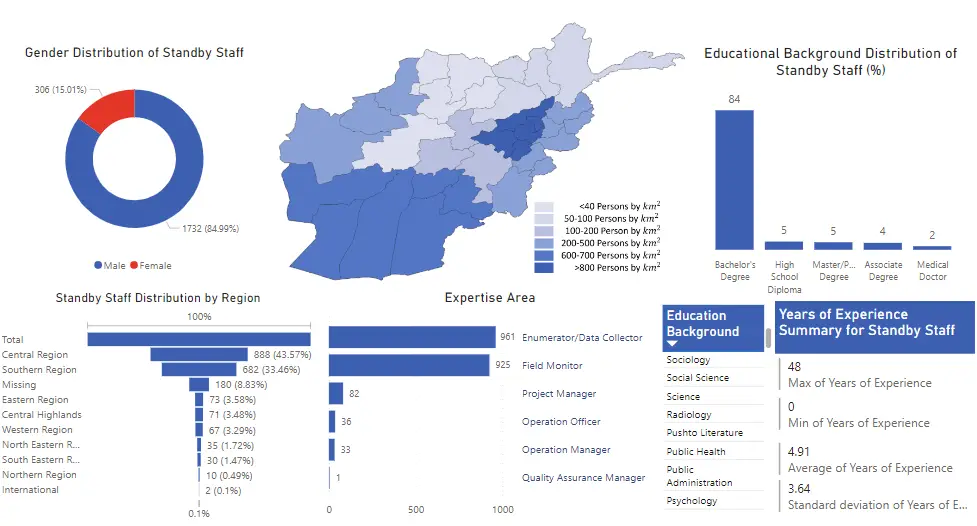
Services We Provide
At ELCS, we harness the transformative potential of research to drive impactful programs. We are connected to premier global research networks, enabling us to evaluate the potential impact of investments across various sectors. Utilizing our curiosity and expertise, we produce insightful whitepapers on diverse topics, collaborating independently and with leading academic institutions worldwide. Moving forward, ELCS aims to focus its publications on enhancing investor understanding of managerial and contextual challenges in Afghanistan.
ELCS is a trusted partner in evaluating the impact of investments, dedicated to enhancing program quality and effectiveness through evidence-based decision-making. In the challenging Afghan context, we tackle significant monitoring obstacles such as high-security risks, data scarcity, limited national capacities, corruption, and expatriate travel restrictions. Our methodologies instill confidence in linking field improvements to funded programs, facilitating robust reporting on results, outcomes, and value for money. We adhere to international standards including DAC criteria, theory of change, results-based frameworks, and frameworks from UN-Women, UNDP, UNFPA, UNICEF, and WFP, providing actionable insights. ELCS offers cost-effective expertise in monitoring projects to establish baselines and target outcomes at both portfolio and program levels. Additionally, we excel in crafting compelling narratives that illustrate the transformative impacts of your investments in Afghanistan.
In the development and reconstruction of Afghanistan, various interventions from other countries have been implemented to revitalize its administrative and social infrastructures. However, there is currently no mechanism to assess their adaptability or measure their impact in the Afghan context. ELCS recognizes the critical role of operational research in addressing the complex and multifaceted issues that influence decision-making processes.
We offer operational research services to support organizations in making informed decisions when designing programs or interventions to address development challenges in Afghanistan. By applying scientific methods, we aim to enhance the effectiveness of interventions, operations, and management decisions. Our approach utilizes a variety of tools and mathematical models to solve everyday problems that impact decision-making. Through our research, we provide actionable insights that help improve program design, implementation, and outcomes.
Major development projects worldwide typically require the production of Environmental and Social Impact Assessments (ESIAs). The concept of ESIAs is gaining momentum in Afghanistan due to the implementation of significant development and infrastructure projects. Currently, the country heavily relies on the expertise and services of foreign institutions for these assessments. While some local institutions offer ESIAs, they do not meet the growing demand for such services. Recognizing this need and building on our successful engagements in previous ESIAs, ELCS offers comprehensive ESIA services to national and international organizations. We are well-versed in the ESIA guidelines and recommendations prepared by various institutions, including the World Bank, the Asian Development Bank, JICA, the National Environmental Protection Agency, and the Environmental Law of Afghanistan. Our studies adhere to these guidelines to ensure thorough and compliant assessments. Our services support informed decision-making, sustainable development, and the responsible management of natural and social resources in Afghanistan.
In the complex environment of Afghanistan, feasibility studies are crucial for evaluating the viability of humanitarian and development projects. These studies provide critical insights into the potential success and impact of proposed initiatives.
ELCS offers comprehensive feasibility study services, aiding organizations in making informed project investment decisions. We assess technical, economic, legal, and operational factors to determine project viability and effectiveness, employing the latest research methodologies to ensure accuracy and reliability. Our expertise includes adherence to international standards and guidelines, ensuring that feasibility studies support sustainable development and best practices. With ELCS, organizations gain the assurance needed to proceed with projects that are practical, impactful, and aligned with the needs of Afghan communities.
In Afghanistan’s diverse and evolving market landscape, understanding consumer behavior, market dynamics, and emerging trends is essential for informed decision-making. ELCS specializes in comprehensive market research services tailored to the local context. We employ advanced research methodologies to gather actionable insights into market preferences, competitive landscapes, and strategic opportunities. Our approach integrates qualitative and quantitative analysis to provide nuanced perspectives that drive effective market strategies. ELCS collaborates closely with clients to identify growth opportunities, mitigate risks, and optimize market entry strategies. Whether evaluating product feasibility or assessing market demand, our rigorous market research empowers organizations to navigate challenges and capitalize on opportunities in Afghanistan’s evolving marketplace.
In Afghanistan’s humanitarian to development context, conducting thorough needs assessments is pivotal for understanding and addressing critical gaps and challenges. ELCS excels in conducting comprehensive needs assessments that inform strategic planning and resource allocation. Our methodology combines qualitative and quantitative approaches to capture a holistic understanding of community needs, vulnerabilities, and priorities. We engage stakeholders at all levels to ensure inclusivity and accuracy in our assessments. ELCS delivers actionable insights that guide program design, targeting interventions where they are most needed. From assessing health and education needs to evaluating infrastructure and livelihoods, our needs assessments empower organizations to make informed decisions that positively impact Afghan communities.
The Rise of Third-Party Monitoring (TPM) Services in Afghanistan
Amidst a growing demand for transparency and effectiveness in the utilization of development funds, the international community has increasingly turned to TPM services to verify and validate reported achievements by government institutions and other project implementers. Initially introduced by the World Bank, TPM serves as a critical tool for assessing and validating results across various sectors. While TPM has emerged as a more objective and reliable strategy for evaluating development efforts in Afghanistan, concerns persist regarding the selection and methodologies of TPM providers. Reports highlight issues with transparency in provider selection, with instances of favoritism and pre-arranged agreements undermining the credibility of TPM outcomes. Moreover, challenges in the conduct of TPM, such as selective reporting of positive results, threaten the long-term legitimacy of TPM findings.
In the face of escalating security risks and geographic constraints that hinder direct monitoring by development and humanitarian organizations, TPM has become an essential alternative. Leveraging its extensive experience in research, monitoring, and evaluation, ELCS responds to the market demand with comprehensive TPM and verification services.
ELCS has successfully delivered TPM/TPV services to prominent development partners including the World Bank, World Food Organization, Child Fund Afghanistan, and key Afghan ministries such as Education, Higher Education, and Public Health. By offering robust TPM/TPV solutions, ELCS ensures rigorous assessment and validation of project outcomes, reinforcing accountability and enhancing the impact of development initiatives in Afghanistan.
In Afghanistan, women and youth face significant socio-cultural barriers, limited access to resources, and restrictive conditions that impact their empowerment and equality. Addressing these challenges requires a comprehensive approach to gender analysis to ensure inclusive and effective development programs. At the ELCS, we recognize the importance of tackling gender disparities to promote equality, inclusivity, and sustainable development. Our gender analysis services provide insights into gender dynamics, enabling organizations to design and implement programs that address these disparities and empower all community members. Our services include baseline and end-line gender assessments, gender mainstreaming strategies, gender-sensitive data collection and analysis, stakeholder engagement, evidence-based policy and program recommendations, and impact evaluations and reporting. In Afghanistan, we tailor our services to the specific needs and sensitivities of women and youth, ensuring that our interventions are culturally sensitive and impactful.
Our extensive experience in gender analysis, particularly in projects related to women’s health, empowerment, and capacity building, ensures that our interventions are both culturally sensitive and impactful. We prioritize gender equality in our office policies, maintaining a gender profile and policy that reflects our commitment to inclusivity, with a governance board striving for a gender balance of over 50% and a nationwide network of over 2,000 female enumerators and data collectors who effectively reach marginalized women and girls. Our team of experienced gender specialists, researchers, and field practitioners possesses extensive knowledge in gender studies and a deep understanding of local and global gender issues, ensuring that integrating gender analysis into projects allows for the inclusion of all voices and addresses all needs, leading to more equitable and sustainable development outcomes.
At the ELCS, we deliver comprehensive data management services for informed decision-making and effective project execution. Our services cover every aspect of data management, from collection to reporting, using the latest tools and technologies. We deploy advanced data collection platforms like ODK, KOBO, and other specialized tools to ensure accurate and real-time data capture. Data entry is streamlined with tools such as CSPro, EPI Info, and ENA software, particularly for SMART nutrition studies, ensuring precision and data integrity. For quantitative analysis, we utilize the latest licensed versions of STATA, SAS and SPSS, offering in-depth statistical insights. Qualitative data is analyzed using Atlas.Ti and NVivo, which help us identify and interpret key patterns and insights. Data visualization is performed with R, Python, and PowerBI, enabling us to create detailed and accessible reports. Our GIS capabilities, including QGIS, allow for precise mapping and spatial analysis, adding important geographic context to our data.
As a local partner, ELCS has played a crucial role in various research projects by providing essential support for research implementation in local and marginalized areas. We manage data collection, data management, and analysis, and subsequently relay these insights to our partners. Our services are underpinned by rigorous quality assurance and Monitoring and Evaluation (M&E) practices throughout every project stage, ensuring accuracy and reliability.
1- ELCS Professional Development Approach
Inspired by USAID’s model for building human and institutional capacity, ELCS focuses on professional development programs that benefit both individuals and institutions. In other words, our instructional design and curriculum developers consider the needs of both individuals and organizations. This creates a win-win situation where our programs not only enhance an individual’s job performance but also support their career aspirations. Additionally, our model helps organizations institutionalize their capacity building efforts by involving them in the design phase, ensuring their specific needs are addressed in our professional development courses. Unlike traditional training programs that only target individuals, ELCS has a proven track record of offering courses in various disciplines, training professionals in development and humanitarian sectors from diverse organizations.
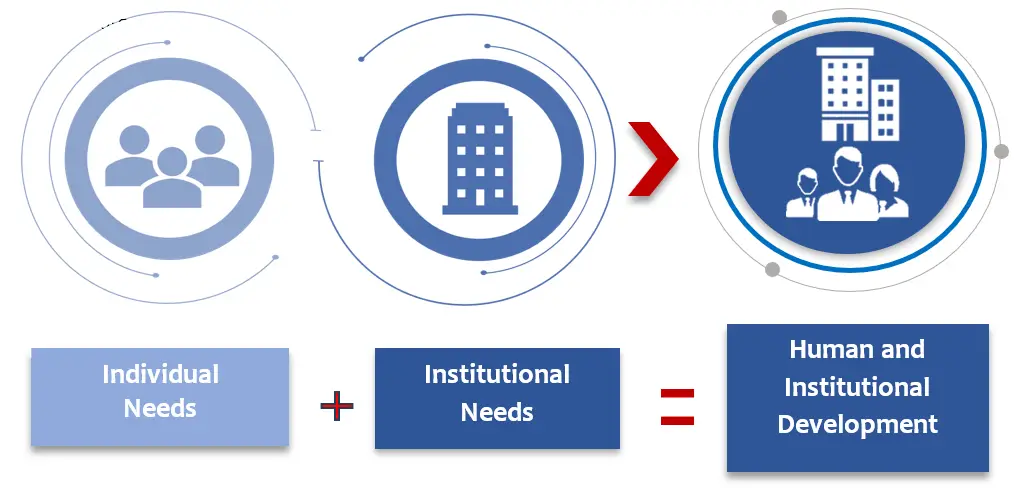
2- ELCS SPECIALIZED EXPERTISE IN COURSE & CURRICULUM DESIGN
ELCS team brings over a decade of experience in instructional design including curriculum development and course design. Working with key development projects in Ministry of Higher Education, Ministry of Education and other education institutions, ELCS team members have been involved in curriculum reform efforts at the national level. This included curriculum reform efforts at Kabul Medical University undertaken by USAID and World Bank supported projects including the Higher Education Project (HEP) and Strengthening Higher Education Project (SHEP). Working with HEP, selected members of ELCS team led curriculum reform efforts at Kabul Medical University including design of a Master of Public Health Program.
Meanwhile, ELCS team members have been involved in reform efforts for midlevel professionals including midwifery, nursing, allied health. Working with international organizations including USAID/REACH, Aga Khan University and University of Massachusetts, selected members of ELCS team work with other partners to develop and establish Accreditation System for midwifery and nursing program in the country. They were involved in development of education and accreditation standards for the two professions.
OUR TRAINER’S CAPACITY
Our pool of national and international trainers are well qualified and experienced individuals who bring over a decade experience delivering high quality training in different topics both in and outside of Afghanistan. The Company has a database of large network of trainers that knows Afghan context and delivers trainings using up to date materials involving models and frameworks from international literature and how best to apply in the workplace. Our network of trainers holds a minimum of Master’s degree bringing well over a decade experience in their areas of specialty.
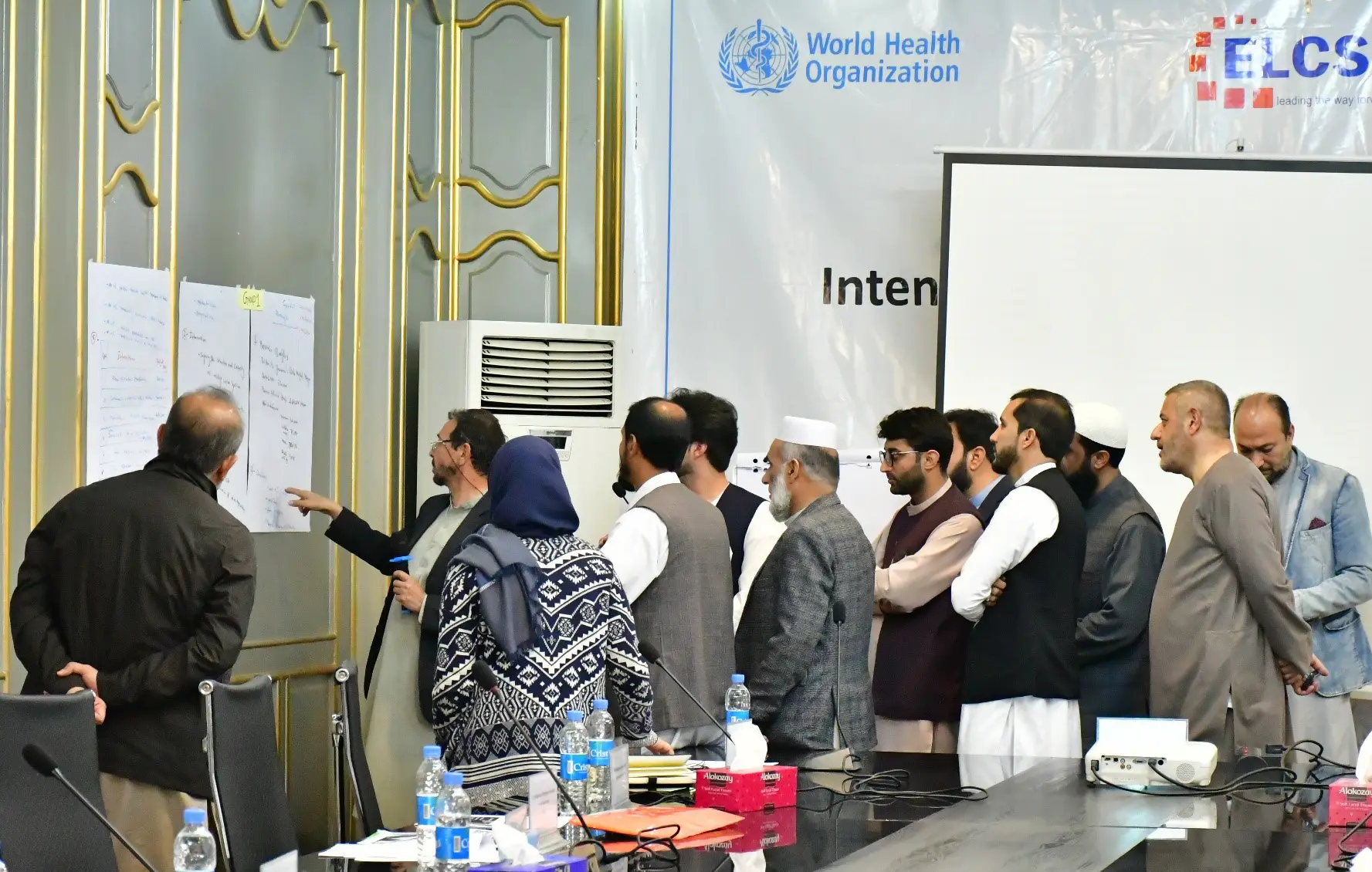
7 Steps of Our Trainin
This initial step involves conducting a thorough analysis of the training needs within an organization or among a group of individuals. It includes identifying the specific skills, knowledge, and competencies that need to be developed or improved. This may involve online assessment, interviews, performance evaluations, and other methods to gather information about the current state of knowledge and skills.
Once the training needs are identified, clear and measurable learning objectives are established. These objectives should be aligned with the identified needs and should be specific, achievable, relevant, and time-bound (SMART). Setting clear objectives helps guide the development of the training program and allows for effective evaluation of its success.
In this step, training materials are created or curated to support the learning objectives and facilitate the training process. This may include developing presentations, handouts, workbooks, online modules, videos, and other resources. The materials should be designed to engage participants and effectively convey the necessary information and skills.
The actual delivery of training program takes place in this step. Master Trainers and facilitators conduct the training sessions, whether they are in-person, virtual, or a combination of both. The delivery should be interactive, engaging, and tailored to the needs and learning styles of the participants. This step may also involve providing opportunities for practice, feedback, and reinforcement of key concepts.
After the training, an evaluation will be conducted to assess the program’s effectiveness and effiency. This may involve gathering participant feedback through surveys or interviews, assessing learning outcomes, and measuring the impact of the training on performance and behavior. The evaluation helps determine the success of the training and identifies areas for improvement.
In this stage, the results of the training evaluation will be compiled and reported to stakeholders, including donor, top management, HR, or the training department. The report may include a summary of the training outcomes, analysis of the feedback received, course proceeding, identification of strengths and weaknesses, and recommendations for future training initiatives. Reporting helps demonstrate the value of the training program and informs decision-making for future training efforts.
Following the training, ELCS mostly conducting post-training support or follow-up to ensure that the newly acquired knowledge and skills are being applied effectively in the workplace. This may involve additional coaching, mentoring, or refresher sessions to reinforce learning, address any remaining questions or concerns, and provide ongoing support for application of the training content.
ELCS Conducted Intensive Courses
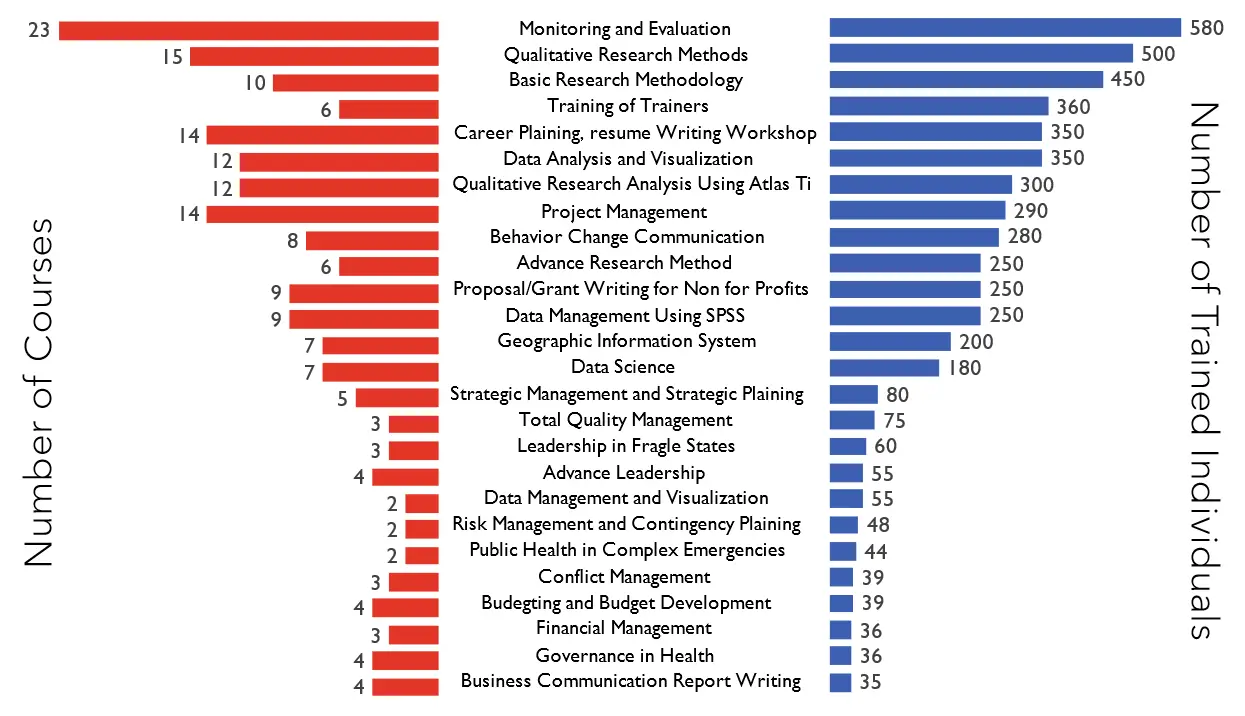
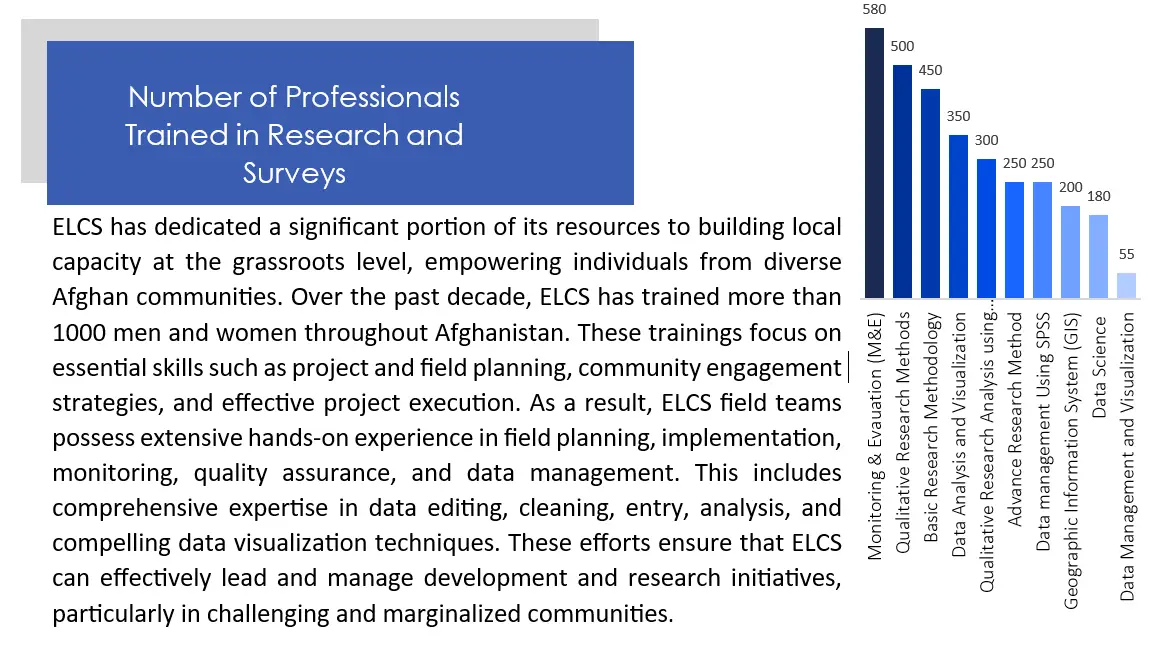
Scope of Engagement
- Maternal and Neonatal Death Surveillance and Response Program Performance Assessment across 12 provinces, supported by the Asian Development Bank (ADB), World Bank (WB), World Health Organization (WHO), and UNICEF
- Third Party Monitoring of World Food Programme Humanitarian Interventions across 5 provinces in the Southern Zone of Afghanistan, World Food Organization (WFP)
- Basic Nutrition and Hygiene Curriculum Review and Assessment for the Citizen Charter Afghanistan and Women Economic Empowerment Development Program Participants, The World Bank (WB), Ministry of Public Health (MoPH), Ministry of Rural Rehabilitation and Development (MoRRD)
- Impact evaluation of Fred Hollow Foundations, Integration of Eye care in the healthcare system in Afghanistan
- Case-Series Evaluation of the Impact and Effectiveness of Monovalent Rotavirus Vaccine in Afghanistan and Post-Marketing Intussusception Monitoring in Afghanistan after Introduction of Oral Rotavirus Vaccine, Centre for Disease and Control
- Third-party monitoring of 3 disbursement link indicators for the Ministry of Higher Education and the World Bank’s Higher Education Development Program (MoHE).
- Assessment of Laboratory Equipment and Technical Staff Training Needs in 23 Public Universities in Afghanistan, World Bank (WB), Ministry of Higher Education (MoHE).
- Health Facility Baseline Assessment, Global Fund Afghanistan, Ministry of Public Health
- Mid-Term Program Evaluation of Eye Projects in Afghanistan, Fred Hollows Foundation
- Third Party Validation of Three Disbursement Link Indicators, World Bank (WB), Ministry of Higher Education (MoHE).
- Midterm Review of Poverty and Gender Inequality Reduction Program in Afghanistan, Hand in Hand.
- Assessment of Legal Aid System in Afghanistan, Open Society Afghanistan.
- Implementation of International Health Partnership Monitoring Round Five in Afghanistan, Health Research Action and IHP+ Consortium.
- Formative Research Menstrual Hygiene Management among Adolescent girls in 12 schools in 6 provinces in Afghanistan, United Nations Children Fund Afghanistan (UNICEF).
- Formative Evaluation of Canada’s Contribution (over 2 billion) to Maternal Newborn Care as Part of Muskoka Initiative
- Third Party Monitoring and Verification of School Records Including Students’ Performance in Selected Number of Provinces in Afghanistan as part of their Equal Access to Education for Nomadic Population, Child Fund Afghanistan
- Reliability Assessment of School Enrollment Data for Kuchi Schools, for Child Fund Afghanistan
- Reliability Assessment of Enrolment Data for More than 1500 Schools, Ministry of Education, Afghanistan (MoHE) Reliable Technology Services and the World Bank (WB).
- Review of Programmatic Options for Polio Eradication and Routine Immunization Services in Afghanistan for Department of Foreign Affairs, Trade and Development of Canada to identify areas of future investment by Canadian Government.
- Situation Analysis of Afghanistan Midwifery Association, Johns Hopkins Program for the Education of Gynecologist and Obstetricians.
- Health Insurance Feasibility Study in Afghanistan, Palladium Group and Arizona State University.
- Summative Program Evaluation of Canada’s Official Development Assistance (ODA) in Afghanistan: Through Canadian Program Support Unit, ELCS was engaged to provide technical support as Health Advisor to the ECORYS Netherlands responsible for Evaluation of the Canadian Investment in Afghanistan for the period 2002-3 to 2012-13.
- Impact Measure Evaluation of Japan’s Official Development Assistance in Education Sector in Afghanistan.
- Stakeholder Analysis (Consultation) with regards to Construction of a Water Storage Project in Kabul, Ministry of Energy and Water (MEW) of Afghanistan, World Bank (WB).
- Market Feasibility Assessment for “Zinc” Production in Afghanistan, Micronutrient Initiative (MI).
- Assessment of Role of NGOs in Immunization Program in Afghanistan, Alliance of Health Organizations and Global Alliance for Vaccine and Immunization.
- Impact Evaluation of a Community Based Urban Health Projects in Four districts of Kabul Province, Care International Afghanistan.
- Enterprise Performance Audit of Three Mining Companies in Eastern Afghanistan, Global Risk Group.
- Market Study for Small and Medium Enterprises in Faizabad and Badakhshan, Refugee Education Trust.
- Environment Impact Assessment of Pharmaceutical Waste in Kabul, Health Partners International of Canada.
- Assessment of Shelter Assistance to IDPs and Returnees in Southeast Afghanistan, United Nations High Commissioner for Refugees (UNHCR).
Portfolio Overview Dashboard
This dashboard provides a comprehensive view of our department’s portfolio, showcasing key indicators such as project types, geographic distribution across all provinces of Afghanistan, sample size of all research projects, type of donors, and gender representation. It also highlights ELCS growth over the years, displaying the number of projects implemented from establishment to the present. The overview includes 40 projects covering areas such as project evaluations, system assessments, surveys, research studies, third-party monitoring, gender analysis, and situation analysis. Notably, our projects have reached marginalized populations in sensitive cultural contexts, with female respondents or beneficiaries comprising 52.3% of the total.
